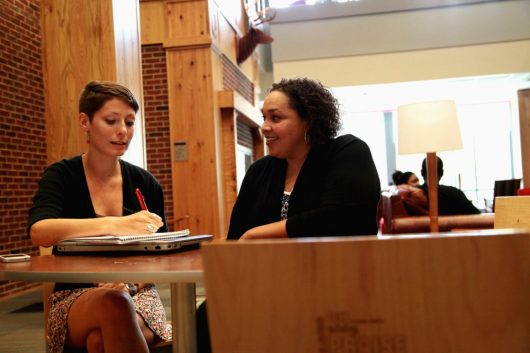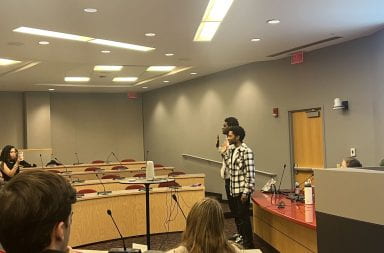
A STEP advisor meets with student involved in program. Credit: Courtesy of Ohio State
Undergraduate Student Government is taking steps in an attempt to improve the Second-Year Transformational Experience Program at Ohio State by creating a more career-based focus for its curriculum.
STEP is divided into cohorts — groups of around 20 students — that each meet with a faculty adviser each week to discuss the program and students’ plans for their projects. These meetings usually run for an hour and a half.
Currently, students are required to go to three professional-development co-curricular programs that are on different dates than their meetings with advisers. USG saw this requirement as something that drives students to attend what fits their schedules, rather than what is most relevant to their majors or desired areas of profession.
Along with merging professional development into the curriculum at cohort meetings, USG plans to change the division of cohort groups from randomized to based specifically on major or area of study.
“A lot of people are going to do that based on what fits in their schedules versus what they’re actually interested in, or what can benefit them going into the real world,” said USG senator Kimmy Sullivan, a second-year in political science and international studies. “We feel that this change could personalize the program more by choosing a major or professional area of study that is of interest to you to do more activities on cohort based on that.”
Shamina Merchant, the USG director of student affairs and a second-year in information systems, said that designating specific themes for each cohort could result in a more transformational experience for students.
“By maybe making a business cohort an option for business students — they could interact with students who have similar directions, ideas and goals in mind,” Merchant said.
Hannah Hampton, a third-year in early and middle childhood studies, said her experience would have been more positive if the STEP program was divided based on major or on project ideas.
“I feel like I was less into the meetings because everyone else was super close with each other,” Hampton said. “I also felt like I could have done everything in the meetings on my own time, and would have been fine.”
She said she often felt like the odd one out because the other members in her cohort had similar focuses, while hers differed. Hampton focused on a project that would benefit and fund her love of music, and many others in her cohort focused on educational and internship-based projects.
Sullivan is also currently enrolled in the STEP program. She said that while her experiences have been positive, she hears a lot of complaints about wasted time after meetings.
“A lot of people I’ve talked to think that the cohort time is not being utilized properly,” Sullivan said. ”These people will go to their meeting (and come) out of it feeling like ‘I didn’t need to be at that meeting,’ or feeling like ‘I could have gone through doing this program without the activity that they did at that meeting.”
To counter these feelings of wasted time, the resolution includes the formation of a new standardized curriculum that STEP advisers would follow. Currently, advisers have the freedom to determine what their cohorts learn.
“Student input has been an integral part in the development of STEP from its inception, and we continue to welcome and solicit that input,” Dave Isaacs, spokesman for OSU’s Office of Student Life, said in a statement to The Lantern.
USG has also suggested to add more career-related activities to cohort meetings, including resume review sessions and mock interviews. To ensure these activities are helpful for students, USG would seek experts in professional development programming to suggest specific workshops and points of interest.
“Having a plan could help the faculty members (create) concrete examples of what actually benefits students, and having the same curriculum could get more students involved,” Sullivan said.


